#Devops mastery
Explore tagged Tumblr posts
Text

#DevOps#DevOps Mastery#DevOps Nastery Course#devops mastery training#DevOps mastery Internship#e3l#e3l.co
0 notes
Text

Experience the transformative force of DevOps with Algoworks! Embrace streamlined teamwork, automation, and inventive solutions as we unite Cloud technology with your aspirations.
Join us on the path to DevOps mastery!
1 note
·
View note
Text
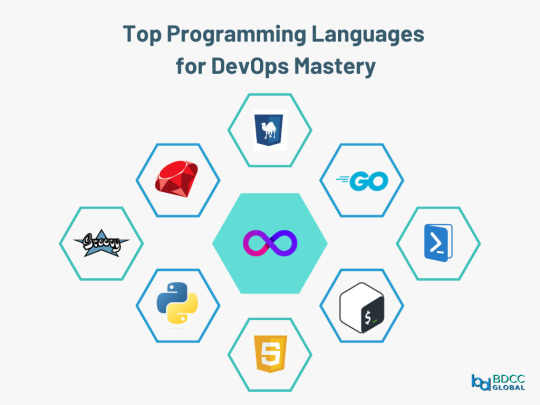
🚀 Elevate your DevOps game with the Top 10 Programming Languages for mastery! 💻✨
Unlock efficiency, automation, and seamless integration. 🌐💡 Which language fuels your DevOps journey? Share your favorites!
0 notes
Text
DevOps Mastery: Key Principles & Artful Tactics 2023
Introduction In the realm of software development, DevOps has emerged as a revolutionary approach, blending development and operations
0 notes
Text
Essentials You Need to Become a Web Developer
HTML, CSS, and JavaScript Mastery
Text Editor/Integrated Development Environment (IDE): Popular choices include Visual Studio Code, Sublime Text.
Version Control/Git: Platforms like GitHub, GitLab, and Bitbucket allow you to track changes, collaborate with others, and contribute to open-source projects.
Responsive Web Design Skills: Learn CSS frameworks like Bootstrap or Flexbox and master media queries
Understanding of Web Browsers: Familiarize yourself with browser developer tools for debugging and testing your code.
Front-End Frameworks: for example : React, Angular, or Vue.js are powerful tools for building dynamic and interactive web applications.
Back-End Development Skills: Understanding server-side programming languages (e.g., Node.js, Python, Ruby , php) and databases (e.g., MySQL, MongoDB)
Web Hosting and Deployment Knowledge: Platforms like Heroku, Vercel , Netlify, or AWS can help simplify this process.
Basic DevOps and CI/CD Understanding
Soft Skills and Problem-Solving: Effective communication, teamwork, and problem-solving skills
Confidence in Yourself: Confidence is a powerful asset. Believe in your abilities, and don't be afraid to take on challenging projects. The more you trust yourself, the more you'll be able to tackle complex coding tasks and overcome obstacles with determination.
#code#codeblr#css#html#javascript#java development company#python#studyblr#progblr#programming#comp sci#web design#web developers#web development#website design#webdev#website#tech#html css#learn to code
2K notes
·
View notes
Text
The Roadmap to Full Stack Developer Proficiency: A Comprehensive Guide
Embarking on the journey to becoming a full stack developer is an exhilarating endeavor filled with growth and challenges. Whether you're taking your first steps or seeking to elevate your skills, understanding the path ahead is crucial. In this detailed roadmap, we'll outline the stages of mastering full stack development, exploring essential milestones, competencies, and strategies to guide you through this enriching career journey.

Beginning the Journey: Novice Phase (0-6 Months)
As a novice, you're entering the realm of programming with a fresh perspective and eagerness to learn. This initial phase sets the groundwork for your progression as a full stack developer.
Grasping Programming Fundamentals:
Your journey commences with grasping the foundational elements of programming languages like HTML, CSS, and JavaScript. These are the cornerstone of web development and are essential for crafting dynamic and interactive web applications.
Familiarizing with Basic Data Structures and Algorithms:
To develop proficiency in programming, understanding fundamental data structures such as arrays, objects, and linked lists, along with algorithms like sorting and searching, is imperative. These concepts form the backbone of problem-solving in software development.
Exploring Essential Web Development Concepts:
During this phase, you'll delve into crucial web development concepts like client-server architecture, HTTP protocol, and the Document Object Model (DOM). Acquiring insights into the underlying mechanisms of web applications lays a strong foundation for tackling more intricate projects.
Advancing Forward: Intermediate Stage (6 Months - 2 Years)
As you progress beyond the basics, you'll transition into the intermediate stage, where you'll deepen your understanding and skills across various facets of full stack development.
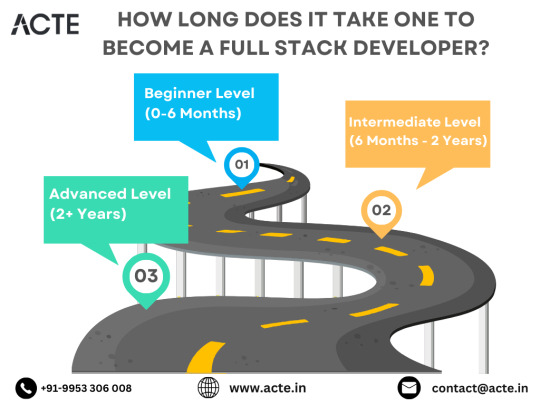
Venturing into Backend Development:
In the intermediate stage, you'll venture into backend development, honing your proficiency in server-side languages like Node.js, Python, or Java. Here, you'll learn to construct robust server-side applications, manage data storage and retrieval, and implement authentication and authorization mechanisms.
Mastering Database Management:
A pivotal aspect of backend development is comprehending databases. You'll delve into relational databases like MySQL and PostgreSQL, as well as NoSQL databases like MongoDB. Proficiency in database management systems and design principles enables the creation of scalable and efficient applications.
Exploring Frontend Frameworks and Libraries:
In addition to backend development, you'll deepen your expertise in frontend technologies. You'll explore prominent frameworks and libraries such as React, Angular, or Vue.js, streamlining the creation of interactive and responsive user interfaces.
Learning Version Control with Git:
Version control is indispensable for collaborative software development. During this phase, you'll familiarize yourself with Git, a distributed version control system, to manage your codebase, track changes, and collaborate effectively with fellow developers.
Achieving Mastery: Advanced Phase (2+ Years)
As you ascend in your journey, you'll enter the advanced phase of full stack development, where you'll refine your skills, tackle intricate challenges, and delve into specialized domains of interest.
Designing Scalable Systems:
In the advanced stage, focus shifts to designing scalable systems capable of managing substantial volumes of traffic and data. You'll explore design patterns, scalability methodologies, and cloud computing platforms like AWS, Azure, or Google Cloud.
Embracing DevOps Practices:
DevOps practices play a pivotal role in contemporary software development. You'll delve into continuous integration and continuous deployment (CI/CD) pipelines, infrastructure as code (IaC), and containerization technologies such as Docker and Kubernetes.
Specializing in Niche Areas:
With experience, you may opt to specialize in specific domains of full stack development, whether it's frontend or backend development, mobile app development, or DevOps. Specialization enables you to deepen your expertise and pursue career avenues aligned with your passions and strengths.
Conclusion:
Becoming a proficient full stack developer is a transformative journey that demands dedication, resilience, and perpetual learning. By following the roadmap outlined in this guide and maintaining a curious and adaptable mindset, you'll navigate the complexities and opportunities inherent in the realm of full stack development. Remember, mastery isn't merely about acquiring technical skills but also about fostering collaboration, embracing innovation, and contributing meaningfully to the ever-evolving landscape of technology.
#full stack developer#education#information#full stack web development#front end development#frameworks#web development#backend#full stack developer course#technology
9 notes
·
View notes
Text
Navigating the DevOps Landscape: A Comprehensive Roadmap for Success
Introduction: In the rapidly evolving realm of software development, DevOps stands as a pivotal force reshaping the way teams collaborate, deploy, and manage software. This detailed guide delves into the essence of DevOps, its core principles, and presents a step-by-step roadmap to kickstart your journey towards mastering DevOps methodologies.
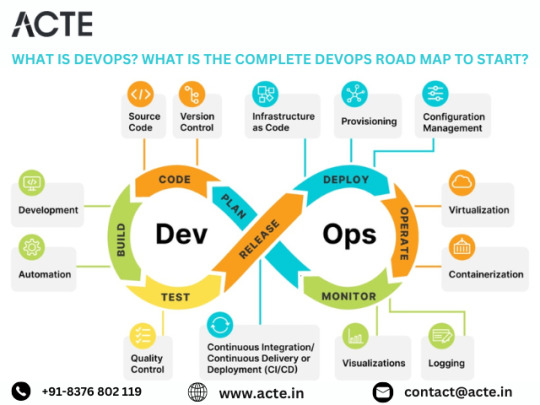
Exploring the Core Tenets of DevOps: DevOps transcends mere toolsets; it embodies a cultural transformation focused on fostering collaboration, automation, and continual enhancement. At its essence, DevOps aims to dismantle barriers between development and operations teams, fostering a culture of shared ownership and continuous improvement.
Grasping Essential Tooling and Technologies: To embark on your DevOps odyssey, familiarizing yourself with the key tools and technologies within the DevOps ecosystem is paramount. From version control systems like Git to continuous integration servers such as Jenkins and containerization platforms like Docker, a diverse array of tools awaits exploration.
Mastery in Automation: Automation serves as the cornerstone of DevOps. By automating routine tasks like code deployment, testing, and infrastructure provisioning, teams can amplify efficiency, minimize errors, and accelerate software delivery. Proficiency in automation tools and scripting languages is imperative for effective DevOps implementation.
Crafting Continuous Integration/Continuous Delivery Pipelines: Continuous Integration (CI) and Continuous Delivery (CD) lie at the heart of DevOps practices. CI/CD pipelines automate the process of integrating code changes, executing tests, and deploying applications, ensuring rapid, reliable, and minimally manual intervention-driven software changes.
Embracing Infrastructure as Code (IaC): Infrastructure as Code (IaC) empowers teams to define and manage infrastructure through code, fostering consistency, scalability, and reproducibility. Treating infrastructure as code enables teams to programmatically provision, configure, and manage infrastructure resources, streamlining deployment workflows.

Fostering Collaboration and Communication: DevOps champions collaboration and communication across development, operations, and other cross-functional teams. By nurturing a culture of shared responsibility, transparency, and feedback, teams can dismantle silos and unite towards common objectives, resulting in accelerated delivery and heightened software quality.
Implementing Monitoring and Feedback Loops: Monitoring and feedback mechanisms are integral facets of DevOps methodologies. Establishing robust monitoring and logging solutions empowers teams to monitor application and infrastructure performance, availability, and security in real-time. Instituting feedback loops enables teams to gather insights and iteratively improve based on user feedback and system metrics.
Embracing Continuous Learning and Growth: DevOps thrives on a culture of continuous learning and improvement. Encouraging experimentation, learning, and knowledge exchange empowers teams to adapt to evolving requirements, technologies, and market dynamics, driving innovation and excellence.
Remaining Current with Industry Dynamics: The DevOps landscape is dynamic, with new tools, technologies, and practices emerging regularly. Staying abreast of industry trends, participating in conferences, webinars, and engaging with the DevOps community are essential for staying ahead. By remaining informed, teams can leverage the latest advancements to enhance their DevOps practices and deliver enhanced value to stakeholders.
Conclusion: DevOps represents a paradigm shift in software development, enabling organizations to achieve greater agility, efficiency, and innovation. By following this comprehensive roadmap and tailoring it to your organization's unique needs, you can embark on a transformative DevOps journey and drive positive change in your software delivery processes.
2 notes
·
View notes
Text
Navigating the Future: Thriving in Automation Testing Careers
In the dynamic landscape of technology, the future of automation testing emerges as a strategic and rewarding career choice, offering enduring prospects and continuous evolution. Here's a deep dive into why automation testing is not just a profession but a journey towards a future filled with opportunities and advancements.

1. Pioneering Technological Evolution: Positioned at the forefront of technological advancements, automation testing serves as a trailblazer, ensuring seamless adaptation to emerging technologies and future innovations.
2. Anchored in Agile and DevOps Realms: The widespread embrace of Agile and DevOps methodologies propels automation testing to the forefront. In an era demanding rapid software releases, automation testing becomes the linchpin for maintaining speed and reliability in development cycles.
3. Surging Demand for Quality Assurance: The escalating complexity of modern software necessitates robust quality assurance processes. Automation testing provides a systematic and efficient approach, meeting the rising demand for top-tier quality in software applications.
4. Efficiency Unleashed: A standout advantage of automation testing lies in its prowess to significantly reduce testing time and costs. Rapid and repetitive execution of automated tests enables efficient bug identification, ensuring swift development cycles.
5. Cross-Industry Versatility: The adaptability of automation testing transcends industry boundaries. Professionals can explore diverse opportunities across sectors like healthcare, finance, e-commerce, and gaming, opening up a spectrum of career avenues beyond conventional limits.
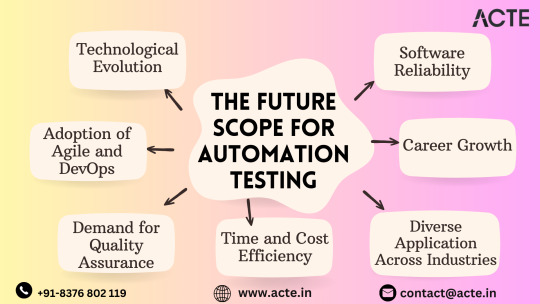
6. Skills Cultivation and Career Ascension: Opting for a career in automation testing provides an enriching environment for skill development. Mastery of automation tools, programming languages, and staying abreast of industry trends pave the way for substantial career growth. Roles such as automation test engineer, test architect, or quality assurance manager showcase the diverse career paths within reach.
7. Fostering Software Reliability: At the core of automation testing is its pivotal role in ensuring the reliability and performance of software applications. Early identification and resolution of issues in the development process contribute to delivering high-quality software products to end-users.
In conclusion, the future of automation testing is a voyage—an exploration of opportunities and advancements. For individuals with a tech-savvy mindset, attention to detail, and a commitment to software quality, choosing a career in automation testing is a forward-thinking and fulfilling decision. As the industry continues to pivot towards automated testing solutions, it remains a field of enduring relevance, promising a future rich with opportunities and impact.
3 notes
·
View notes
Text
Crafting a Career Odyssey: AWS Certification Unveiled for Solution Architects
Embarking on the journey of AWS certification as a Solution Architect unveils a plethora of career avenues, transforming your professional trajectory in the dynamic landscape of cloud computing. Let's explore the myriad paths that unfold for certified AWS Solution Architects:
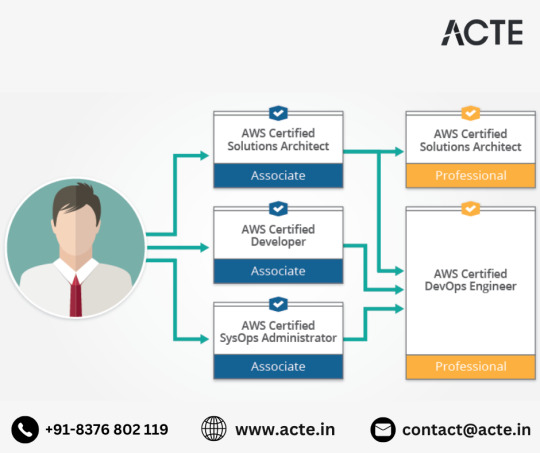
1. Architecting Excellence: Steering Digital Transformations AWS certification catapults you into roles where you architect and implement cutting-edge solutions. As a linchpin in digital transformations, you play a pivotal role in creating scalable, secure, and cost-effective solutions aligned with organizational objectives.
2. Cloud Architect Mastery: Orchestrating Comprehensive Cloud Strategies The journey doesn't stop at Solution Architect; it seamlessly transitions into broader Cloud Architect roles. Here, you orchestrate end-to-end cloud strategies, ensuring optimal performance, security, and efficiency in cloud-based environments.
3. Enterprise Architect Pinnacle: Shaping Holistic IT Strategies With AWS certification, the pathway extends to Enterprise Architect roles. This involves shaping the overarching IT strategy, aligning technology solutions with business goals, and ensuring seamless integration across the enterprise.
4. Cloud Consulting Expertise: Guiding Clients on Cloud Journey Organizations seek AWS-certified Solution Architects for Cloud Consultant positions, where you provide guidance on cloud strategies, migration plans, and optimize AWS infrastructure for enhanced performance.
5. Technical Leadership Zenith: Guiding Development Initiatives Expertise gained through AWS certification positions you favorably for technical leadership roles. Leading teams, guiding development projects, and offering strategic input on technology initiatives become part of your purview.
6. DevOps Alchemy: Bridging Development and Operations The fusion of AWS expertise and Solution Architect skills opens doors to DevOps Engineer opportunities. Your grasp of cloud infrastructure proves invaluable in optimizing continuous integration and deployment pipelines.
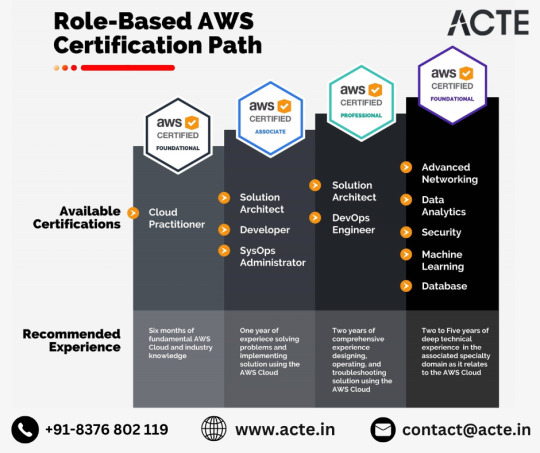
7. Pre-Sales Artistry: Crafting Compelling Solutions Leverage AWS certification in Pre-Sales Solutions Architect positions. Engaging with clients during the pre-sales phase, you become instrumental in understanding their needs and crafting compelling solutions.
8. Specialized Architectural Prowess: Exploring Niche Opportunities As technology evolves, specialized Solution Architect roles emerge. Depending on your interests and the evolving AWS service landscape, opportunities in areas like AI/ML architecture, IoT solutions, or serverless architectures beckon.
9. Entrepreneurial Odyssey: Beyond Conventional Paths Armed with AWS certification, entrepreneurial pursuits become viable. Whether offering specialized AWS services or launching a tech startup, the certification serves as a foundation for innovative endeavors.
10. Lifelong Learning Odyssey: Staying Ahead in the Dynamic AWS Realm The AWS ecosystem is dynamic, with constant updates and new services. Your certification journey becomes a springboard for continuous learning and professional development, ensuring you remain at the forefront of cloud technology.
In conclusion, AWS certification for Solution Architects is not just a validation; it's a compass guiding you through a rich tapestry of career possibilities. Whether crafting digital landscapes, steering enterprises through the cloud, or exploring niche opportunities, the certification becomes a catalyst for continuous growth, learning, and innovation in the ever-evolving cloud computing domain.
2 notes
·
View notes
Text
Unveiling the Ultimate Handbook for Aspiring Full Stack Developers
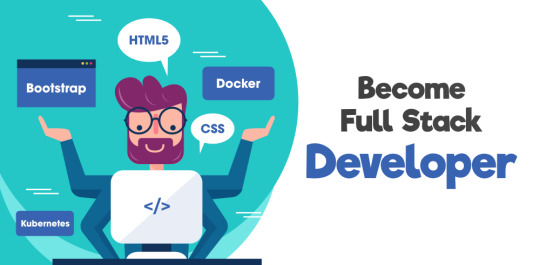
In the ever-evolving realm of technology, the role of a full-stack developer has undeniably gained prominence. Full-stack developers epitomize versatility and are an indispensable asset to any enterprise or endeavor. They wield a comprehensive array of competencies that empower them to navigate the intricate landscape of both front-end and back-end web development. In this exhaustive compendium, we shall delve into the intricacies of transforming into a proficient full-stack developer, dissecting the requisite skills, indispensable tools, and strategies for excellence in this domain.
Deciphering the Full Stack Developer Persona
A full-stack developer stands as a connoisseur of both front-end and back-end web development. Their mastery extends across the entire spectrum of web development, rendering them highly coveted entities within the tech sector. The front end of a website is the facet accessible to users, while the back end operates stealthily behind the scenes, handling the intricacies of databases and server management. You can learn it from Uncodemy which is the Best Full stack Developer Institute in Delhi.
The Requisite Competencies
To embark on a successful journey as a full-stack developer, one must amass a diverse skill set. These proficiencies can be broadly categorized into front-end and back-end development, coupled with other quintessential talents:
Front-End Development
Markup Linguistics and Style Sheets: Cultivating an in-depth grasp of markup linguistics and style sheets like HTML and CSS is fundamental to crafting visually captivating and responsive user interfaces.
JavaScript Mastery: JavaScript constitutes the linchpin of front-end development. Proficiency in this language is the linchpin for crafting dynamic web applications.
Frameworks and Libraries: Familiarization with popular front-end frameworks and libraries such as React, Angular, and Vue.js is indispensable as they streamline the development process and elevate the user experience.
Back-End Development
Server-Side Linguistics: Proficiency in server-side languages like Node.js, Python, Ruby, or Java is imperative as these languages fuel the back-end functionalities of websites.
Database Dexterity: Acquiring proficiency in the manipulation of databases, including SQL and NoSQL variants like MySQL, PostgreSQL, and MongoDB, is paramount.
API Expertise: Comprehending the creation and consumption of APIs is essential, serving as the conduit for data interchange between the front-end and back-end facets.
Supplementary Competencies
Version Control Proficiency: Mastery in version control systems such as Git assumes monumental significance for collaborative code management.
Embracing DevOps: Familiarity with DevOps practices is instrumental in automating and streamlining the development and deployment processes.
Problem-Solving Prowess: Full-stack developers necessitate robust problem-solving acumen to diagnose issues and optimize code for enhanced efficiency.
The Instruments of the Craft
Full-stack developers wield an arsenal of tools and technologies to conceive, validate, and deploy web applications. The following are indispensable tools that merit assimilation:
Integrated Development Environments (IDEs)
Visual Studio Code: This open-source code editor, hailed for its customizability, enjoys widespread adoption within the development fraternity.
Sublime Text: A lightweight and efficient code editor replete with an extensive repository of extensions.
Version Control
Git: As the preeminent version control system, Git is indispensable for tracking code modifications and facilitating collaborative efforts.
GitHub: A web-based platform dedicated to hosting Git repositories and fostering collaboration among developers.
Front-End Frameworks
React A potent JavaScript library for crafting user interfaces with finesse.
Angular: A comprehensive front-end framework catering to the construction of dynamic web applications.
Back-End Technologies
Node.js: A favored server-side runtime that facilitates the development of scalable, high-performance applications.
Express.js: A web application framework tailor-made for Node.js, simplifying back-end development endeavors.
Databases
MongoDB: A NoSQL database perfectly suited for managing copious amounts of unstructured data.
PostgreSQL: A potent open-source relational database management system.
Elevating Your Proficiency as a Full-Stack Developer
True excellence as a full-stack developer transcends mere technical acumen. Here are some strategies to help you distinguish yourself in this competitive sphere:
Continual Learning: Given the rapid evolution of technology, it's imperative to remain abreast of the latest trends and tools.
Embark on Personal Projects: Forge your path by creating bespoke web applications to showcase your skills and amass a portfolio.
Collaboration and Networking: Participation in developer communities, attendance at conferences, and collaborative ventures with fellow professionals are key to growth.
A Problem-Solving Mindset: Cultivate a robust ability to navigate complex challenges and optimize code for enhanced efficiency.
Embracing Soft Skills: Effective communication, collaborative teamwork, and adaptability are indispensable in a professional milieu.
In Closing
Becoming a full-stack developer is a gratifying odyssey that demands unwavering dedication and a resolute commitment to perpetual learning. Armed with the right skill set, tools, and mindset, one can truly shine in this dynamic domain. Full-stack developers are in high demand, and as you embark on this voyage, you'll discover a plethora of opportunities beckoning you.
So, if you aspire to join the echelons of full-stack developers and etch your name in the annals of the tech world, commence your journey by honing your skills and laying a robust foundation in both front-end and back-end development. Your odyssey to becoming an adept full-stack developer commences now.
5 notes
·
View notes
Text
#DevOps#DevOps Mastery#devops mastery training#devops mastery internship#devops internship in pune#e3l#e3l.co
0 notes
Text
DevOps Roadmap Plan: A Hands-On Path to Mastery in 2025 #devops #homelab #git #ai #homeserver #cloud
0 notes
Text
Fuel Your Coding Journey with Full Stack Development Mastery
In today’s fast-paced digital world, technology is evolving rapidly—and so are the demands for skilled developers who can build, optimize, and maintain both the front-end and back-end of web applications. This is where full stack development enters the spotlight. If you’re aspiring to become a well-rounded developer, it’s time to fuel your coding journey with full stack development mastery.
Mastering full stack development opens doors to a variety of career paths in software engineering, product development, and tech entrepreneurship. Whether you're a beginner or an experienced programmer, choosing the right training institute plays a crucial role in shaping your future.
What is Full Stack Development?
Full stack development refers to the ability to work on both the client-side (frontend) and server-side (backend) of web applications. A full stack developer is a versatile professional capable of building complete, functional, and scalable digital products.
The core components of full stack development include:
Frontend Technologies: HTML, CSS, JavaScript, React, Angular
Backend Technologies: Java, Node.js, Python, PHP
Databases: MySQL, MongoDB, PostgreSQL
Version Control Systems: Git, GitHub
Deployment & DevOps: Docker, Jenkins, AWS
A comprehensive understanding of these technologies allows developers to create seamless and user-friendly applications from start to finish.
Why Choose Full Stack as a Career?
The demand for full stack developers continues to grow as companies seek professionals who can manage complete project lifecycles. Here are some compelling reasons to fuel your coding journey with full stack development mastery:
Versatility: Ability to work on multiple layers of technology.
High Demand: Recruiters prefer candidates who can take ownership of both backend and frontend tasks.
Lucrative Salaries: Skilled full stack developers command competitive compensation.
Entrepreneurial Edge: Perfect skillset for launching tech startups or freelance projects.
Job Security: Wide range of industries need full stack expertise, from fintech to healthcare.
How to Start Your Full Stack Development Journey?
The first step is choosing the best full stack development training institute in Pune or your local area. Pune, being a rising IT hub, is home to several reputed institutes offering hands-on training with real-world projects.
A quality training institute should offer:
Practical Learning: Focus on live projects and real-time development.
Experienced Faculty: Mentors with real industry experience.
Career Support: Resume building, interview prep, and placement assistance.
Certifications: Industry-recognized credentials that enhance your profile.
Why Java is Still Relevant in Full Stack?
Even though newer technologies are emerging, Java continues to be a cornerstone in enterprise-level development. It is stable, secure, and widely used in backend systems.
If you’re starting from scratch or looking to strengthen your backend development skills, enrolling in a Java training institute in Pune can be a great foundation. Java-based frameworks like Spring Boot and Hibernate are still highly in demand in full stack job roles.
Benefits of Learning Java for Full Stack Development:
Robust and platform-independent.
Easy integration with front-end frameworks.
Strong community support and libraries.
Powerful tools for backend development.
What Makes Pune a Learning Hotspot?
Pune has emerged as a favorite destination for aspiring developers due to its balance of affordable education and booming tech industry. With the presence of numerous MNCs and startups, Pune provides a dynamic environment for learners.
When looking for the best full stack development training institute in Pune, make sure the institute provides:
Updated curriculum aligned with industry needs.
Mentorship from software architects and engineers.
Job placement records and success stories.
Internship opportunities with local IT firms.
Features to Look for in a Full Stack Course
Before enrolling, ensure the course offers:
Complete Stack Coverage: HTML5, CSS3, Bootstrap, JavaScript, React, Node.js, Express.js, MongoDB/MySQL, Git.
Project-Based Learning: Build projects like e-commerce platforms, dashboards, or portfolio websites.
Interactive Classes: Regular assessments, code reviews, and Q&A sessions.
Capstone Projects: Opportunity to showcase your skills through a final project.
Kickstart Your Journey Today
Whether you’re passionate about building web apps or aiming for a career switch, full stack development is the ideal launchpad. It equips you with everything you need to stand out in today’s competitive job market.
Remember, the right mentorship can make all the difference. Seek out a Java training institute in Pune that also offers full stack development programs. Or better, opt for the best full stack development training institute in Pune that gives you exposure to multiple technologies, industry insights, and placement opportunities.
Final Thoughts
It’s not just about learning to code; it’s about transforming the way you think and create digital solutions. When you fuel your coding journey with full stack development mastery, you equip yourself with tools and knowledge that go beyond theory.
Take the leap. Choose the right course. Surround yourself with the right mentors. And soon, you’ll not just be coding—you’ll be building, innovating, and leading the digital future.
0 notes
Text
Fix Deployment Fast with a Docker Course in Ahmedabad
Are you tired of hearing or saying, "It works on my machine"? That phrase is an indicator of disruptively broken deployment processes: when code works fine locally but breaks on staging and production.
From the perspective of developers and DevOps teams, it is exasperating, and quite frankly, it drains resources. The solution to this issue is Containerisation. The local Docker Course Ahmedabadpromises you the quickest way to master it.
The Benefits of Docker for Developers
Docker is a solution to the problem of the numerous inconsistent environments; it is not only a trendy term. Docker technology, which utilises Docker containers, is capable of providing a reliable solution to these issues. Docker is the tool of choice for a highly containerised world. It allows you to take your application and every single one of its components and pack it thus in a container that can execute anywhere in the world. Because of this feature, “works on my machine” can be completely disregarded.
Using exercises tailored to the local area, a Docker Course Ahmedabad teaches you how to create docker files, manage your containers, and push your images to Docker Hub. This course gives you the chance to build, deploy, and scale containerised apps.
Combining DevOps with Classroom Training and Classes in Ahmedabad Makes for Seamless Deployment Mastery
Reducing the chances of error in using docker is made much easier using DevOps, the layer that takes it to the next level. Unlike other courses that give a broad overview of containers, DevOps Classes and Training in Ahmedabad dive into automation, the establishment of CI/CD pipelines, monitoring, and with advanced tools such as Kubernetes and Jenkins, orchestration.
Docker skills combined with DevOps practices mean that you’re no longer simply coding but rather deploying with greater speed while reducing errors. Companies, especially those with siloed systems, appreciate this multifaceted skill set.
Real-World Impact: What You’ll Gain
Speed: Thus, up to 80% of deployment time is saved.
Reliability: Thus, your application will remain seamless across dev, test, and production environments.
Confidence: For end-users, the deployment problems have already been resolved well before they have the chance to exist.
Achieving these skills will exponentially propel your career.
Conclusion: Transform Every DevOps Weakness into a Strategic Advantage
Fewer bugs and faster release cadence are a universal team goal. Putting confidence in every deployment is every developer’s dream. A comprehensive Docker Course in Ahmedabador DevOps Classes and Training in Ahmedabadcan help achieve both together. Don’t be limited by impediments. Highsky IT Solutions transforms deployment challenges into success with strategic help through practical training focused on boosting your career with Docker and DevOps.
#linux certification ahmedabad#red hat certification ahmedabad#linux online courses in ahmedabad#data science training ahmedabad#rhce rhcsa training ahmedabad#aws security training ahmedabad#docker training ahmedabad#red hat training ahmedabad#microsoft azure cloud certification#python courses in ahmedabad
0 notes
Text
Mastering AWS DevOps Certification on the First Attempt: A Professional Blueprint
Embarking on the journey to AWS DevOps certification can be both challenging and rewarding. Drawing on insights from Fusion Institute’s guide, here’s a polished, professional article designed to help you pass the AWS Certified DevOps Engineer – Professional exam on your first try. Read this : AWS Certifications 1. Why AWS DevOps Certification Matters In today’s cloud-driven landscape, the AWS DevOps Professional certification stands as a prestigious validation of your skills in automation, continuous delivery, and agile operations. Successfully earning this credential on your first attempt positions you as a capable leader capable of handling real-world DevOps environments efficiently. 2. Solidify Your Foundation Before diving in, ensure you have: Associate-level AWS certifications (Solutions Architect, Developer, or SysOps) Hands-on experience with core AWS services such as EC2, S3, IAM, CloudFormation A working knowledge of DevOps practices like CI/CD, Infrastructure-as-Code, and Monitoring Start by reviewing key AWS services and reinforcing your familiarity with the terminology and core concepts. 3. Structured Study Path Follow this comprehensive roadmap: Domain Mastery Break down the certification domains and assign focused study sessions to cover concepts like CI/CD pipelines, logging & monitoring, security, deployment strategies, and fault-tolerant systems. Hands-on Practice Create and utilize play environments using CloudFormation, CodePipeline, CodeDeploy, CodeCommit, Jenkins, and Docker to learn by doing. Deep Dives Revisit intricate topics—particularly fault tolerance, blue/green deployments, and operational best practices—to build clarity and confidence. Mock Exams & Cheat Sheets Integrate Revision materials and timed practice tests from reliable sources. Address incorrect answers immediately to reinforce weak spots. Read This for More Info : Top DevOps Tools Conclusion Achieving the AWS DevOps Professional certification on your first attempt is ambitious—but eminently doable with: Strong foundational AWS knowledge Hands-on experimentation and lab work High-quality study resources and structured planning Strategic exam-day execution Fusion Institute’s guide articulates a clear, results-driven path to certification success—mirroring the approach shared by multiple first-time passers. With focused preparation and disciplined study, your AWS DevOps Professional badge is well within reach. Your AWS DevOps Success Starts Here! Join Fusion Institute’s comprehensive DevOps program and get the guidance, tools, and confidence you need to crack the certification on your first attempt. 📞 Call us at 9503397273/ 7498992609 or 📧 email: [email protected]
0 notes
Text
AWS DevOps Training: A Pathway to Cloud Mastery and Career Growth
With the cloud-based digital revolution of the modern times, organizations are evolving towards flexible methodologies and cloud infrastructure to stay in the running. Therefore, there exists a vast requirement for cloud platform specialists as well as DevOps professionals. AWS DevOps Training addresses this gap by offering quality learning platforms committed to automating processes, enhancing deployment lifecycles, and ensuring scalable applications operating with the support of Amazon Web Services (AWS).
What is AWS DevOps Training?
AWS DevOps Training is a program that integrates the powerful strength of AWS with the efficient simplicity of DevOps. The training equips students with the technical competence to create, deploy, and manage cloud applications in an agile automated environment. It gives prime importance to key DevOps best practices such as Continuous Integration and Continuous Deployment (CI/CD), Infrastructure as Code (IaC), configuration management, monitoring, and security. Training also includes popular tools like AWS CodePipeline, AWS CloudFormation, Docker, Jenkins, Git, and Terraform.
You're an IT operations expert, system administrator, or developer, AWS DevOps Training equips you with the understanding and skills to automate cloud infrastructure and have repeatable, reproducible deployments.
Why is AWS DevOps Training Important?
Implementation of DevOps in cloud environments has brought a paradigm shift in software deployment and delivery by organizations. As the global cloud provider leader, AWS offers a wide range of services that are optimized for DevOps. AWS DevOps Training gives a person the opportunity to utilize these services in order to:
Automate repetitive tasks and reduce deployment failure
Improve speed and frequency of software release
Improve system reliability and scalability
Maximize cross-functional collaboration between development and operations teams
Automate security and compliance across all phases of deployment
Companies today focus more on DevOps-based processes, and these AWS DevOps trained professionals certified are today in high demand in finance, healthcare, e-commerce, and IT industries.
Who Should Take AWS DevOps Training?
AWS DevOps Training is best suited for:
Software developers looking to automate deployment pipelines
System administrators who want to transition from on-premises environments to cloud environments
DevOps engineers interested in enhancing their AWS skills
Cloud architects and consultants managing hybrid or multi-cloud systems
Anyone preparing for the AWS Certified DevOps Engineer – Professional exam
The course often includes hands-on labs, case studies, real-time projects, and certification guidance, making it practical and results-driven.
Key Skills You’ll Gain from AWS DevOps Training
At the end of the training, students are expected to be proficient in skills like:
CI/CD pipeline building and maintenance with AWS tools
Infrastructure automation provisioning with AWS CloudFormation and Terraform
Cloud environment deployment monitoring with CloudWatch and AWS X-Ray
Application deployment management using ECS, EKS, and Lambda
Secure access implementation using IAM roles and policies
Merging all these in-demand skills not only boosts your technical resume but also makes you a valuable asset to any cloud-driven business.
Certification and Career Opportunities
Passing AWS DevOps Training is a valuable step toward achieving the AWS Certified DevOps Engineer – Professional certification. This certification validates your expertise in release automation and application management in AWS. It is industry-approved and often leads to roles like:
DevOps Engineer
Cloud Engineer
Site Reliability Engineer (SRE)
Infrastructure Automation Specialist
Cloud Solutions Architect
As more and more companies move their operations to AWS, certified professionals will certainly be given competitive salaries, employment security, and career growth across the globe.
Conclusion
With the fast pace of digital transformation seen in a globalised economy, DevOps and cloud expertise can no longer be an option—a necessity. AWS DevOps Training is the perfect blend of agile techniques and cloud computing that enables professionals to construct the tools and skills required to thrive in the new world of IT. Whether starting the journey in the cloud or extending DevOps skills, the training creates new avenues to innovation, leadership, and professional achievement.
0 notes